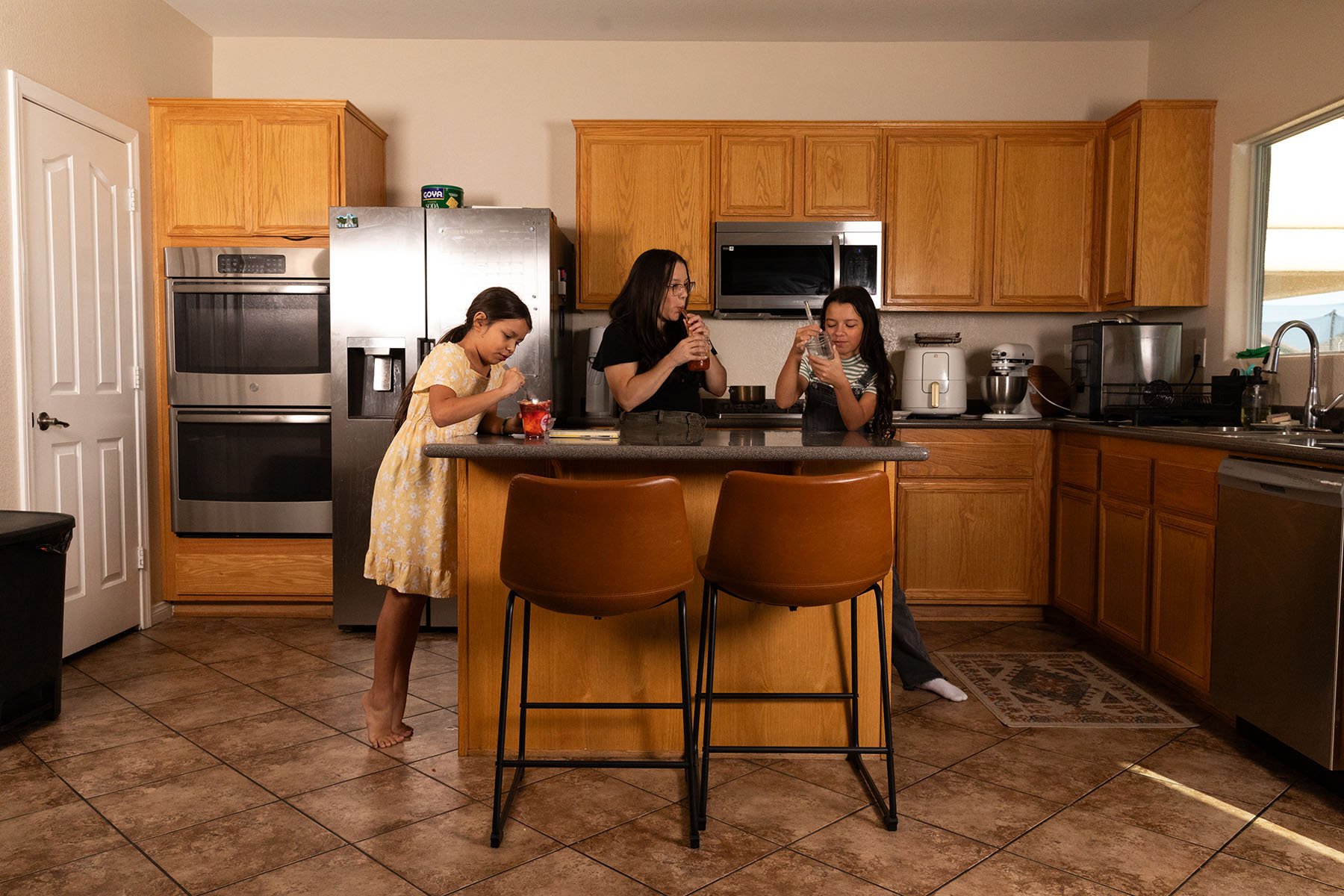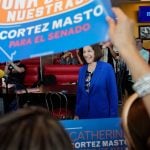Member support made it possible for us to write this series. Donate to our nonprofit newsroom today to support independent journalism that represents you.
NORTH LAS VEGAS, Nevada — Jasmine Lopez and her three daughters have made homemade boba tea a family staple. Lopez buys the packets from Walmart — “I’m saving so much money,” she says, reaching into the cupboard — and the girls gather around to prepare it together.
It’s an affordable, experiential treat for a family of five working hard to live within their means and save for future dreams, including a home of their own in Nevada with enough space for all of them.
The Lopezes are newcomers to the state, Latinx transplants from Chicago, where high housing prices and the space demands of little girls growing older drove them to look for a home elsewhere. That’s taken the shape of a sunny four-bedroom rental in North Las Vegas that is more expensive than what they had budgeted but cheaper than a similar home in Chicago; it’s also set to jump up in price when their lease comes up for renewal a year from now.
Just weeks away from the presidential election, Lopez, 40, is among Nevada’s undecided voters, and economic concerns, particularly around home affordability, are weighing on her decision. Lopez isn’t deciding whether former President Donald Trump or Vice President Kamala Harris will do a better job growing the country’s economy and housing supply; she’s among the high share of voters who are disillusioned with the country’s political system, and whether any candidate will deliver “tangible solutions.” She is hoping to cast a ballot, and has less than a month to decide.
“I think both sides have become so polarizing and have missed the humanity of the everyday person,” Lopez said. “That’s gonna be really hard, really hard, because I know I definitely don’t want one side, right, but then at the same time, are you really for the people?”
Lopez’s choice holds a lot of political weight in Nevada, where one-fifth of all registered voters are Latinx, the second highest share of any battleground state behind Arizona. Latinas like Lopez account for more than half of those voters and register and turn out at higher rates than Latinx voters overall. In a state where the presidential election in 2020 came down to fewer than 34,000 votes, and the 2022 Senate election just 8,000, undecided Latinas will be deciders.
Lopez is what some analysts call a low-propensity voter: She hasn’t regularly participated in elections and because of that, represents untapped political power. Nationwide, Latinas are less likely to vote than men and women of other racial and ethnic groups — except for Latinx men. This trend holds true in Nevada, where half of eligible Latinx voters have cast ballots going back to 2008, compared with two-thirds of Black and White voters.
The political power Lopez gained by moving to this state has become obvious just a few months into her life here. When she left town for a few days last month, canvassers pinged her Ring doorbell camera several times. When she got home, a pile of campaign leaflets waited for her by her front door. In Vegas, she’s seen more political ads than ever before.
Lopez was raised in the suburbs of Chicago by a single mom who had moved to Illinois from Puerto Rico with Lopez’s grandparents. They were part of a massive wave of arrivals from the U.S. territory in the middle of the last century known as the Great Puerto Rican Migration. Lopez grew up in a working-class family; her mom worked the night shift at a local post office.
Lopez was proud to graduate college and eventually launch a photography business. She and Jeremy got married in 2006 and within a couple of years, bought a home and had their first child. But then they got ensnared by the Great Recession, filed for bankruptcy and, in 2010, lost their home to foreclosure. Black families and Latinx families like theirs were disproportionately affected by the financial crisis. Through it all, Lopez says, politics wasn’t top of mind for her.
In the lead-up to Trump’s first election, Lopez admits, “I wasn’t paying much attention.” She was never a Democrat or a Republican, and political issues “felt too big a problem for me to feel like, ‘Oh, I can be part of the solution.’” It didn’t help that by the time she became eligible to vote, Illinois was a solidly blue state, and she had internalized that her vote didn’t really matter. She said she also wasn’t equipped with basic voting information. “What does it even look like to go to a voting station and put your vote in?” Lopez said, recalling her mindset in her 20s.
“As Latinas, there's this fear around not wanting to make a mistake and wanting to get it right,” Lopez said. “I won’t speak for an entire demographic, but for me, I just felt like, ‘I don’t know enough and therefore I’m not going to vote.’”
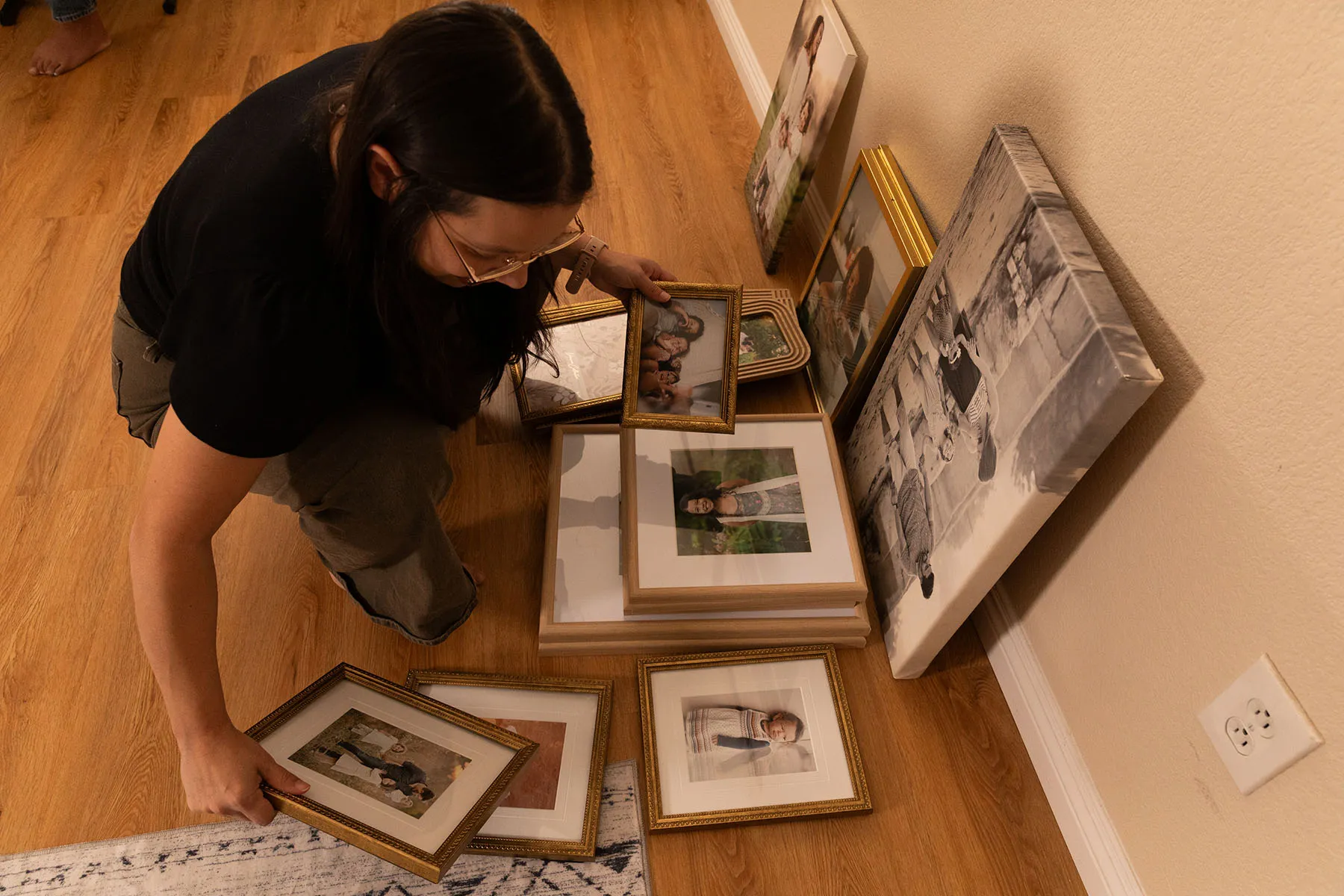
Lopez's experience speaks to a broader — and stubborn — trend among Latina voters, said Stephanie Valencia, who studies Latinx voters at Equis Research, a progressive polling firm, and is particularly interested in mobilizing Latinas to the ballot box. These voters, she said, are more likely than Latino men to vote for Democrats but are very much open to persuasion, something that is “very candidate- and issue-specific.”
Valencia said they are also more likely to report that they don’t feel confident or informed enough to vote.
“The sentiment is really real in my family,” Valencia said. She offers the example of a cousin who works as a nurse and sees voting as an activity that people in more political jobs engage in. “Part of what we want to be able to do is to teach people that you don't need to have a PhD in political science to vote.”
She added: “Latinas really do kind of sit at this really important position of power in our families and our communities, and I want to understand what it will take to see the same kind of levels of engagement that we see with, say, Black women or White women.”
For Lopez, who cast her first ballot in a presidential election in 2020, the political awakening came in 2017. It didn’t have to do with the economy, but very much with her identity. After a Category 5 hurricane struck Puerto Rico, her grandparents’ homeland, Lopez was taken aback by Trump’s reaction. The island had been decimated, its infrastructure had been shattered and 3,000 lives had been lost when Trump, on a visit, tossed rolls of paper towels at a crowd of churchgoers.
The island’s slow recovery pained her.
“I have a privilege as a Puerto Rican who lives on the mainland to help vote and speak into policies and systems in a way that my Puerto Rican neighbors on the island cannot,” Lopez said. “What am I going to do about this voting power, and what does that influence look like for me to actually move into action, even if I feel silly and dumb?”
Lopez ultimately cast a vote for Biden after considering a third-party candidate. This cycle, she didn’t have plans to vote for Biden or Harris, who replaced him on the ticket, though she’s curious about her while also weighing third-party options. She feels disillusioned by major parties and powerful politicians. She’s distraught by the ongoing conflict in Gaza and the civilian death toll there. Closer to home, she sees politicians forgetting about everyday people.
In her old neighborhood in Chicago, she watched neighbors become priced out as gentrification pushed up housing prices and “astronomically high” tax rates made the place entirely unaffordable.
“It just became economically challenging for our family to be able to dream about how we could provide housing for our kids,” Lopez said. “For years, we’ve been saying, man, we’re dreaming of a backyard. We’re dreaming of our own bedrooms. The [Chicago] apartment was only two bedrooms, so for six years, the kids shared.”
Latinx voters, like Americans overall, report in surveys that pocketbook issues are their top priority heading into the November election. A September survey of 3,000 Latinx voters by UnidosUS, a Latinx civil rights group, almost 60 percent ranked the rising cost of living as one of their top three issues. Housing affordability, which first registered among the top five issues in 2023, is now the No. 1 priority for Latinx voters across all eight states surveyed. Latinas were five points more likely to say housing affordability was a key issue than Latinos.
“Whether they've been here many generations or are more recent immigrants, homeownership is often a central part of [Latinx voters’] family story — whether it was the goal or a big milestone that was achieved,” said Laura Arce, the top housing policy expert at UnidosUS. (UnidosUS’s political arm has endorsed Harris.)
In Nevada, more than half of Latinx residents own a home. Still, they’re 15 percent less likely to do so than White residents. In the Las Vegas metro area, the median sale price for existing single-family homes has increased more than 39 percent since the start of the pandemic and rental rates have risen faster than the national average, making it difficult for prospective homeowners to save for a down payment.
“In 2022, that's when housing affordability really, really became probably the number one issue I was hearing out the doors,” said Nevada Assemblywoman Sandra Jauregui, a Democrat, who is running for reelection in a district south of Las Vegas.
Juaregui said she encounters many older voters living on a fixed income and struggling to afford rent. “I also started hearing from young adults, people who wanted to achieve that American dream and buy a home, and that was also so far out of reach because the cost of housing was just skyrocketing.”
Nevada Democrats like Juaregui have lined up behind Harris’ housing plan, which would offer $25,000 in down payment assistance for first-time home buyers and would make it less profitable for corporations to scoop up single-family homes from the market. Harris has also proposed boosting the supply of homes through a series of tax credits, including billions in tax credits for builders.
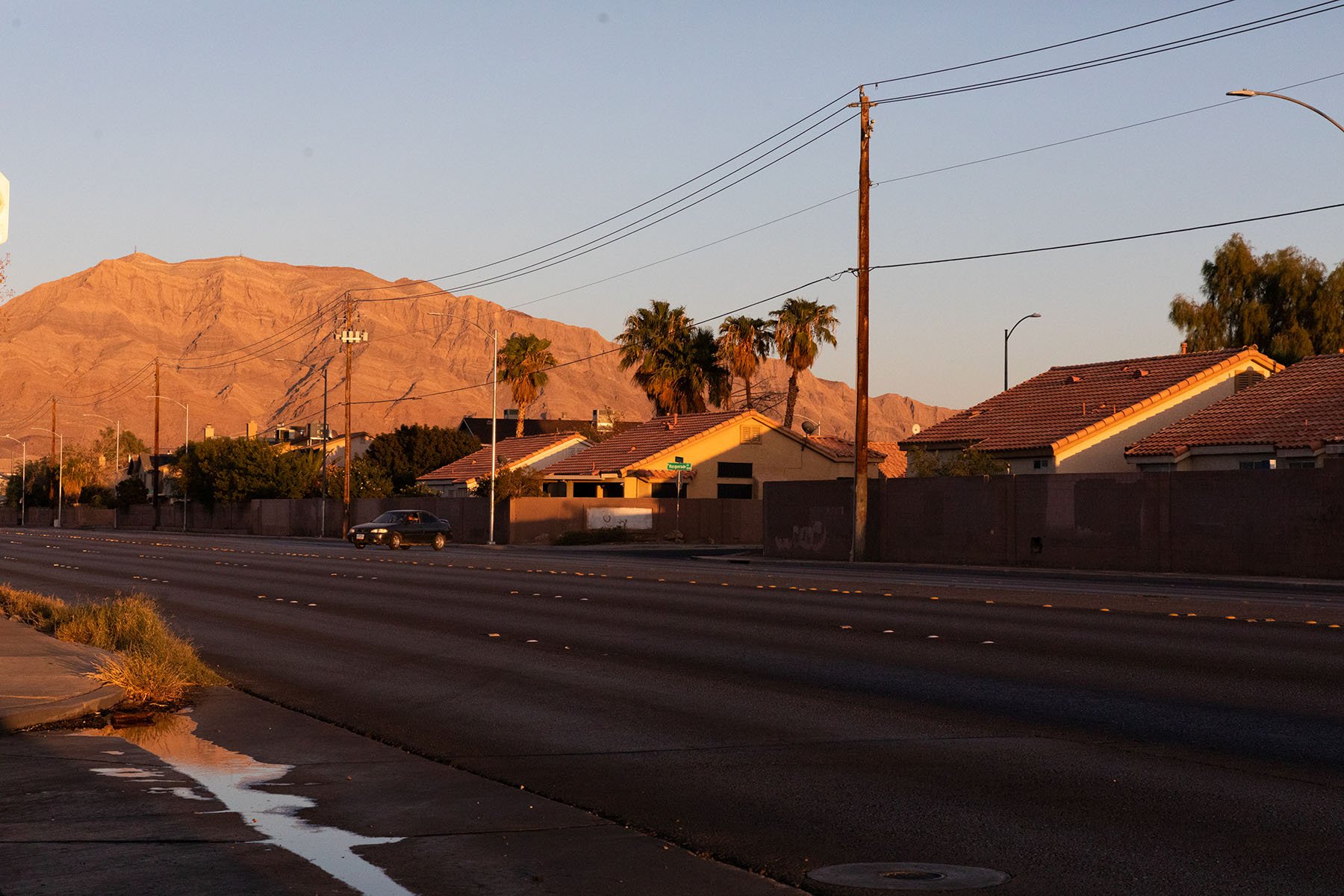
Trump, for his part, told voters during a rally in mid-September in Las Vegas that if he were elected, he would open up federal lands for low-regulation, low-tax housing developments. Trump has also said he would push for lower interest rates, despite the president having no direct control over those.
Economists and housing advocates also worry about how Trump’s plans for mass deportations of undocumented immigrants, who account for a large share of workers in the construction industry, line up with plans to boost the country’s supply for new homes.
On the economy overall, Trump holds a slight advantage over the Democratic ticket, one that has waned over the last several months. A Washington Post analysis found that advantage to be six points with all voters. A recent Equis survey of Latinx voters found Trump had a three-point edge over Harris when voters were asked who they think will be “better for the U.S. economy.”
On a hot September afternoon, political canvassers with the Culinary Union Local 226 — which represents hospitality workers in this tourism-focused city, most of them Latinas — arrived at the home of Irasema Bravo, a small apartment in a cluster of blue stucco buildings north of the Strip.
When the two women handed over a door tag and said they were rallying support for la Señora Kamala Harris, Bravo’s husband, Alberto, immediately responded, “Harris, no. I’m with Trump.” He then added, over a blaring TV, that he didn’t want to hear another word about Harris.
When the canvassers turned to Bravo, she said quietly that she too was with “the other side,” and then turned to go back into her apartment. The canvassers moved on to other voters.
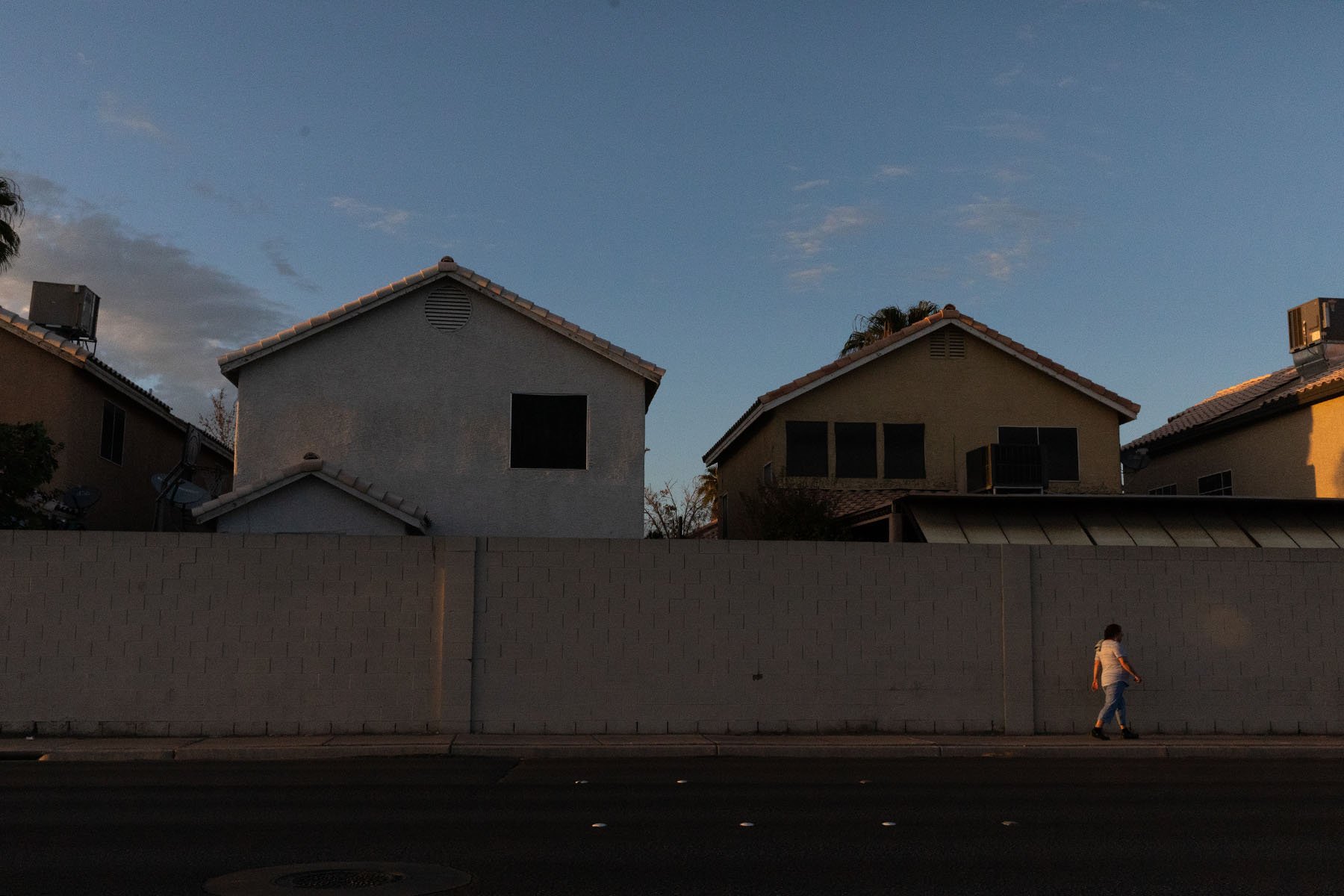
Later in an interview, Bravo said she actually hadn’t made up her mind about the election yet but was planning to cast her ballot one way or another.
Bravo said the economy and health care are the “fundamental” topics of the election and that if the economy is “on the floor,” the rest of the country will follow. She said she doesn’t regret voting for Biden in 2020, but that when she goes to the store, the prices are hard to ignore.
“If you look at how much things cost, it’s just so high,” Bravo said. “What I liked about Trump was that [when he was president] people had jobs, the economy was trending up. … But now, when you go to the store, the cash I have only goes to buy a few things.”
At Lopez’s home, all five family members are gathered on a gray sectional with reclining seats that they bought on Facebook Marketplace for $850. By the looks of it, it was a good deal. Lopez’s husband, Jeremy, explains that by puzzling together credit card benefits and his reimbursable work travel expenses, they've been able to “hack” family vacations — a creative way to pay for trips that would have otherwise been unaffordable.
They recently cobbled together enough perks and points to cover the cost of a trip to California’s Universal Studios, which has a themed ride inspired by “Jurassic Park” that the girls and their dad love. Emery, the youngest child, is eager to show off a display of movie memorabilia, shaving cream cans and all.
The family had long been settled in the suburb of Maywood, a working-class area in Chicago’s West Side. There, they shared a small apartment inside an old firehouse that also housed Lopez’s nonprofit, aimed at helping local teens and young adults. Back then, some of the family trips they took brought them to Las Vegas and sparked their desire to move out West.
The oldest of the three children, 16-year-old Dakota, has a lot of doctors’ appointments to manage a gastrointestinal condition and has been homeschooled on and off for years, adding to the need for more space at home. Seated in their spacious kitchen in North Las Vegas, Lopez explains that she is also homeschooling Emery, 9, and Savannah, 12, to help with their transition to a new state. Both girls smile when their mother says they hope to start public school in January. Savannah eventually goes upstairs while Emery hangs back, playing with her iPad and a dry-erase whiteboard.
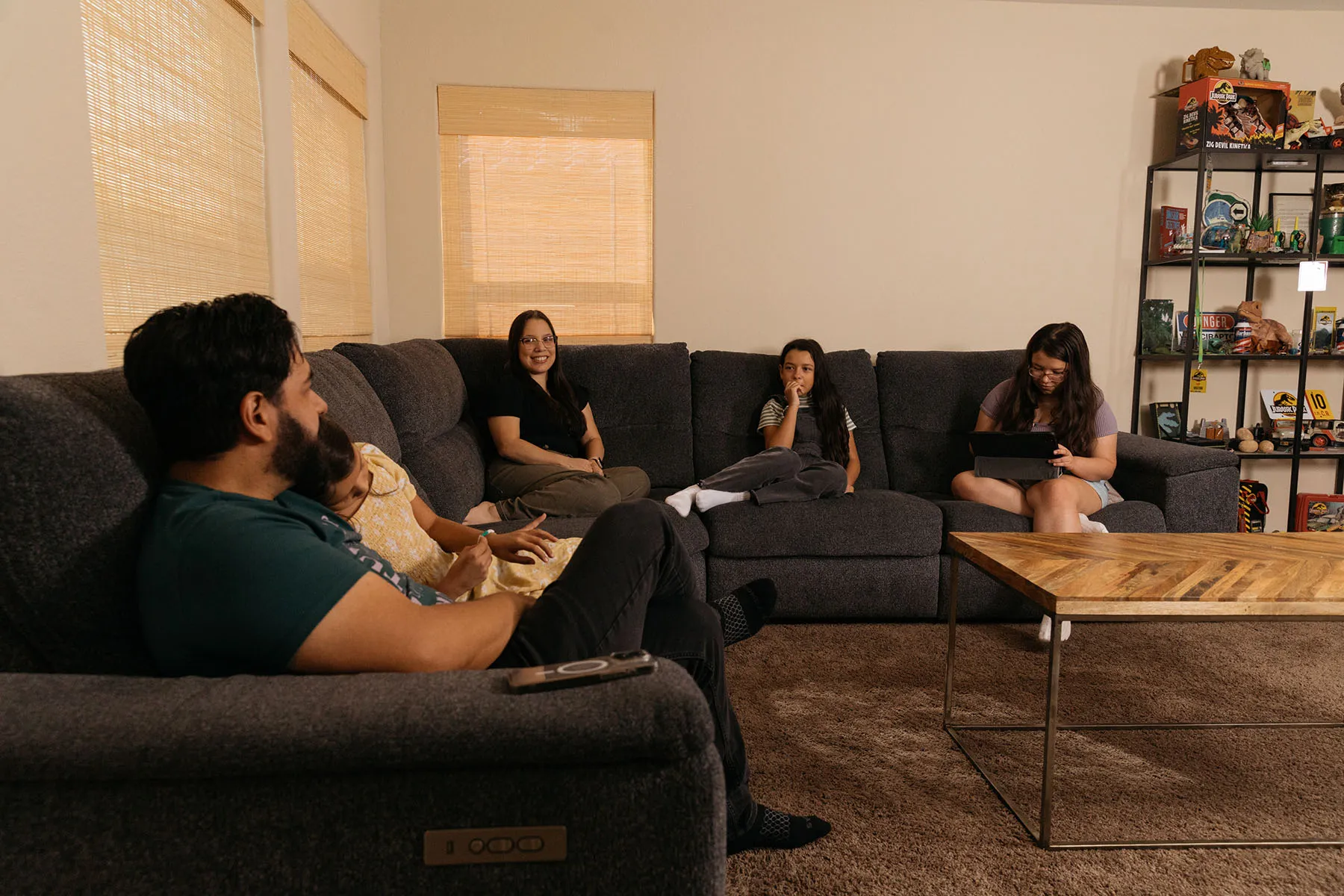
Peeling away from their home in Chicago was a difficult decision, Lopez says, but their budget seemed to stretch much further in the outskirts of Las Vegas. Last year, while still in Chicago, they started to look at rentals in earnest and watched as prices in their ideal neighborhoods climbed month after month, pushing closer and closer to the top of their budget.
When their home in North Las Vegas went on the market, they rushed to apply. On the day of their showing, they arrived to see three other families also waiting to see the place.
The Lopezes secured the lease at just over budget. The house has a small pool in the backyard — an inflatable alligator takes up a good portion of it. Lopez figured that the built-in activity could replace some family outings, like eating out, and save them money.
“Coming from Chicago with no backyard … we spent most of our budget for the outdoor area where we get to be together as a family,” Lopez said. “Over the last two months, we've really experienced family time together in a way we haven't experienced before. I don’t know, the flow of the space just allows for us to have more independent freedom, but then it's also drawing us closer as a family.”
When they were looking at rentals, Lopez said they were hoping to avoid a home owned by the kinds of corporate landlords that she read have been buying single-family houses in Nevada. They found a private owner who uses a rental management company.
The share of homes owned by hedge funds and investors is projected to grow; Democrats including Harris have proposed cutting tax breaks on corporate landlords. Lopez said she hasn’t heard about Harris’ housing plans — she’s been working and mothering— but hopes to dive into it and watch a playback of the presidential debate sometime before the election. She said she’s not considering voting for Trump; her husband and teenage daughter did watch the debate and reported back on his comments about Haitian immigrants, which, as second- and third-generation immigrants, they all found offensive.
Lopez said she also wants to spend more time digging into third-party candidates. She briefly considered Robert F. Kennedy Jr., whose work on environmental issues grabbed her attention, but now he’s endorsed Trump. Like many of the voters who will decide the election, Lopez wants to see an emphasis on economic policy that works for more people, including housing that is more affordable.
The idea of buying a home for her family in Nevada, Lopez said, right now “feels a little daunting, maybe a little impossible, with where prices are at and the interest rate.” At the same time, the Lopezes rent is slated to increase by 10 percent when their lease comes up for renewal next year.
Lopez said the couple is exploring the possibility of buying land in the outskirts of Las Vegas and building on it, but their research into that is still in its early stages. “It's not completely off the table, but I would say maybe within the next two to three years,” Lopez said.
At their home in Las Vegas, Lopez’s husband and her oldest daughter say goodbye before heading to the local library, which is hosting a meetup for teens who are interested in video games and is a place for Dakota to interact with kids her age. Lopez has one more meeting before her work day is over — she still works for her nonprofit part-time — and her youngest is waiting for her attention. Digging more into the election won’t happen today.
After they head out, Lopez points out that after not voting for years, she is set on casting a ballot this year and wants to bring her teenage daughter into the process since she’ll be eligible to vote in just two years.
“That's what we're trying to teach her as she gets closer to being 18,” Lopez said. “There's never going to be a perfect candidate, but how do we make an informed decision that aligns as much to whatever your own individual values,” Lopez added, “and the collective needs of our community.”
To check your voter registration status or to get more information about registering to vote, text 19thnews to 26797.
